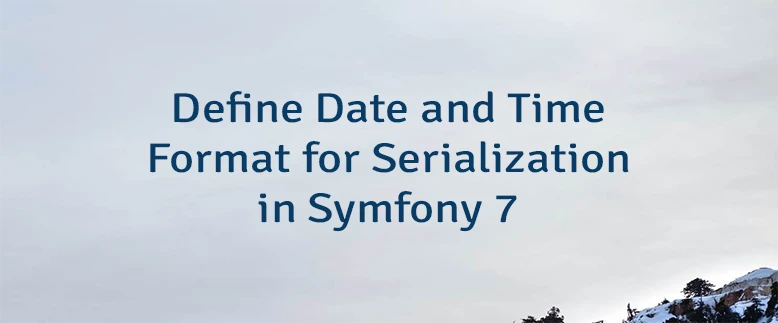The Serializer component supports DateTimeNormalizer that allows to convert DateTimeInterface objects (e.g. DateTime) into date and time format string. By default, RFC3339 format is used.
This tutorial shows how to define date and time format for serialization in Symfony 7 application.
Let's say we have the following class:
src/Entity/Notification.php
<?php
namespace App\Entity;
use DateTime;
class Notification
{
private DateTime $sentAt;
public function getSentAt(): DateTime { return $this->sentAt; }
public function setSentAt(DateTime $sentAt): void { $this->sentAt = $sentAt; }
}The Serializer component allows specifying date and time format using DateTimeNormalizer::FORMAT_KEY option.
src/Controller/TestController.php
<?php
namespace App\Controller;
use App\Entity\Notification;
use DateTime;
use Symfony\Component\HttpFoundation\Response;
use Symfony\Component\Routing\Attribute\Route;
use Symfony\Component\Serializer\Encoder\JsonEncoder;
use Symfony\Component\Serializer\Normalizer\DateTimeNormalizer;
use Symfony\Component\Serializer\SerializerInterface;
class TestController
{
#[Route('/')]
public function index(SerializerInterface $serializer): Response
{
$notification = new Notification();
$notification->setSentAt(new DateTime('2022-02-27 07:50:00'));
$json = $serializer->serialize(
$notification,
JsonEncoder::FORMAT,
[DateTimeNormalizer::FORMAT_KEY => 'Y-m-d H:i:s']
);
return new Response($json); // Output: {"sentAt":"2022-02-27 07:50:00"}
}
}



Leave a Comment
Cancel reply